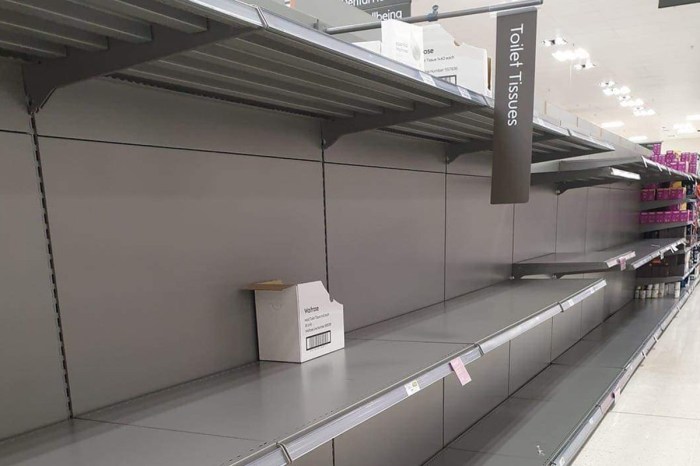
Panic Buying is not just a random phenomenon in your own country. It has sequentially happened in almost every country in the world. It is a unified response to the situation and isn’t something that demonstrates a humans stupidity or something to get angry about.
It is the result of our evolution, psychology, the news, game theory, network effects, economics and the way our society is currently set up.
I’m going to explain:
- The main causes.
- Why we shouldn’t blame people for doing it
- How we can reduce our own panic and the resulting shopping burden
Section 1 – Understanding Why ?
1. Supply Chains
Supermarkets supply 60% of our food normally. We do a lot of consuming outside of our own homes. We work in offices where we have essential items and snacks and things. We go out to eat for lunch or order food in. We go out in the evening to restaurants, pubs, events where we get food. We go on holidays to hotels, we go to festivals. Our children go to school. We spend a lot of time out of our homes eating.
Now that we are all in lockdown, all in our homes, all buying from supermarkets. Things have changed. Supermarkets need to be responsible for almost all of our food. That is a sudden jump.
Without anyone buying more food than normal that is a huge rise to suddenly deal with.
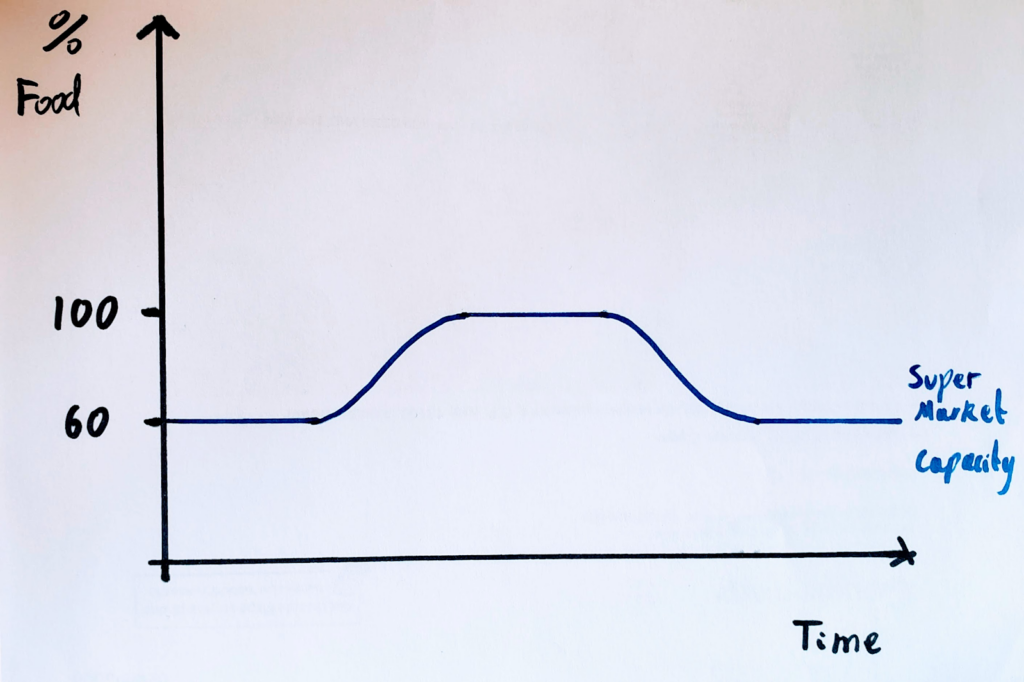
But We Have Plenty of Food
As we’ve been repeatedly told, there is no shortage in food. Because there isn’t. The sun is still shining, food is growing, farmers are farming. Food producers, processors and manufacturers are essential to our nations and they still run.

But a lot of the systems to feed us are are in place to feed us in places we aren’t. Whilst supermarkets get their act together to stay fully stocked we would expect there to be a few issues.
Actually they are more resilient than we might expect and can do this pretty quickly. But with the added burden of panic buying it is not that they need to supply close to 100% of a nations weekly food requirement. They are trying to supply a nations requirement for three weeks in one week.
The Panic Spike
We’ve all been told about the pandemic effects of the disease causing a spike in cases vastly outstripping the healthcares ability to cope with patients. We have the exact same issue with a spike in buying vastly outstripping the capacity of supermarkets.
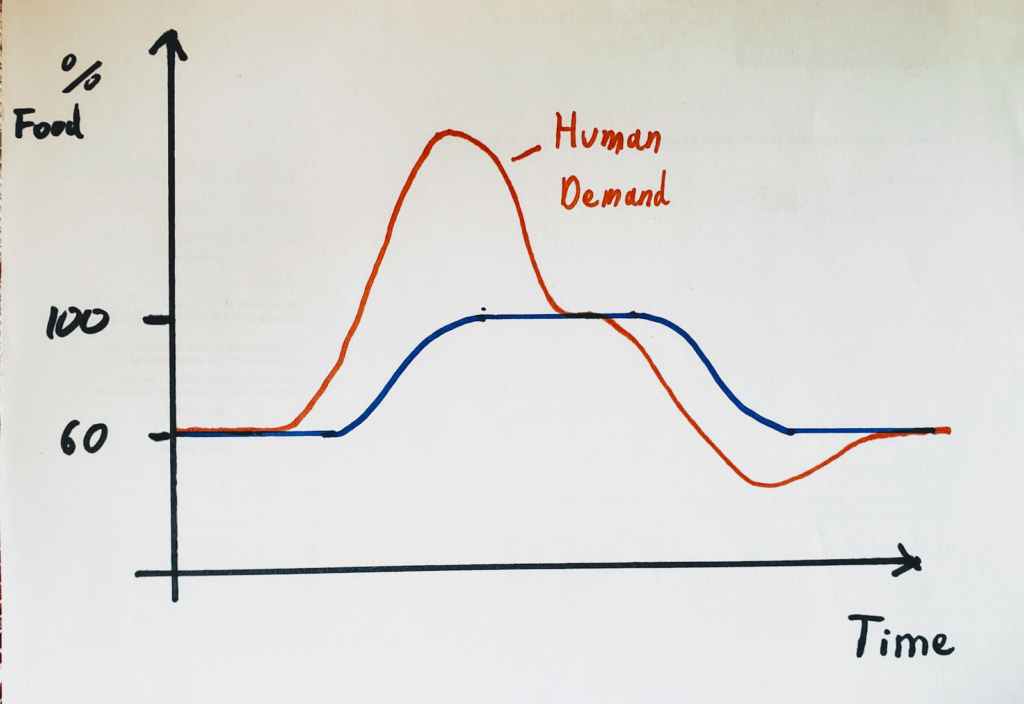
The silly thing is that there is a fundamental difference between the two. When more of us get ill, we need medical care. But when more of us get ill we don’t need more food. The nation hasn’t got 5 times hungrier. There isn’t actually a direct requirement to have more food.
We have been told that we are at war. Yes, we need to be less frivolous with our food and maintain solidarity and expect radical changes in our order of life. But unlike war, no one is bombing our supply chains. No one is listening to our decisions and coming up with ideas to thwart our efforts to work together. There is nothing preventing us from collaborating to overcome our issues.
2. Scary News
The news about the Coronavirus has never been happy. Even when it started back in China and it had nothing to do with us. It was still described as a rampaging deathly virus causing mayhem. As it became global it was only ever shocking headlines about death tolls, countries struggling to cope, healthcare systems crumbling. Everyday it has been a new level of the end of the world.
Fundamental Needs
Now as humans we are evolved to be hunter gatherers. We have basic needs that we need to satisfy. If you look at Maslow’s hierarchy of needs. Food is one of the essential basics.

When you are being told the world is ending and systems are breaking. When you are told you might need to shut yourself in isolation for months and that systems around you are breaking.
Well, quite simply you want to survive. Thus you gather food.
Preserve Your Mental Health
With the feverous levels of anxiety being fuelled by the media. We want to find some certainty and control in our lives. As long as we have food, that is one very important thing that we don’t need to worry about. Stocking up on food is basically a requirement to look after your mental health.
It gives you peace of mind. It helps you to think more logically and reduce the panic that is being created.
Flywheels
The news created the global fear. It then compounded this by heavily documenting every worst case it could find of panic buying. This made us panic more about the fact that food would run out and boosted the fly wheel effect to make us buy more after we had already stocked up once.
It is ironic that the news then told us to not panic buy. This only adds more reasons as we hear it is a national problem. And yes others should stop. But for our own personal situation we don’t want to die so we need to buy even more food just in case.
3. Social effects
The first panic buying that spread across the world started in Australia. They began to worry that they would run low on toilet paper. They import their loo roll from China and it was feared this import would stop.
No sooner than this had been mentioned it started appearing all over social media. If a shelf looked empty (which often happens at points in the day) people would take a photo and post it on social to their friends. Whether or not a store had run out or not people still posted the toilet paper drought. Citizen reporting and amplification of the problem.
Contagious Message
It became a running joke and the coolest kids started making hilarious memes and videos about it.
This message spread across the world. A video on youtube is available globally after-all. Before any lockdowns had happened in Europe or issues with supply chains, we had already ran out of loo paper here in Britain.
From these social networks and Youtube and Tik Tok we had already seen that toilet paper was going to run out. It became it’s own self-fulfilling prophecy. We believed it and thus we made it so.
We commented on how absurd it was as toilet paper has zero protective effects. but we quickly stocked up on loo roll before it ran out.
Flywheel gains Momentum
As the spread of Coronavirus and its effect continued the same thing happened with other products. Hand sanitizer and face masks. The first food product to go here in Britain was pasta.
Even when the whole store was full of food, if the pasta shelves looked empty you would take a photo of just that narrow section of the supermarket and self-declare a national emergency.
The fact that the entire rest of shelf might be full doesn’t make it into the photo and isn’t interesting news to be sharing.
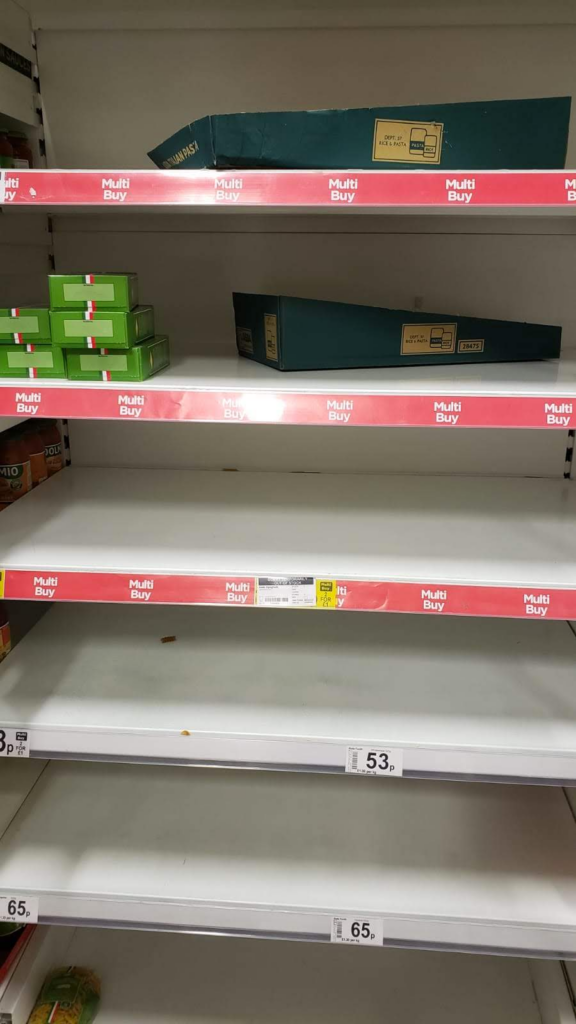
Whether to just a few friends on WhatsApp, your flatmates or broadcast to everyone on social. The news spread and the flywheel effect of our actions self compounded each other. We fuelled our own fire.
4. The Scarcity Effect
As things become scarce they become more valuable. This is a marketing tactic used by companies to increase the value of their items. It is why Diamonds are so expensive despite being mostly useless, yet Oxygen is free despite the fact it is essential for all life.
The scarcity effect has bad consequences when it comes to national emergencies.
Economic Opportunities
As we expect an item on the shelves to sell out. They are actually worth more than the price the are being sold for. So it represents an economic opportunity to buy something at a lower price than it is worth.
Just In Case
Most people won’t buy things with the intention of selling it at a higher price. But we do all like a deal. And we hate paying more than we need for things. If we can buy hand-sanitiser now for 80p or face paying £10 on ebay for the same thing next week. We are obviously going to buy more than we need right now.
Even if we don’t buy for ourselves we like being helpful. If I can spend £3 for an extra four bottles of hand-sanitiser, I can be the hero to help out my neighbours that can’t get it. I’m being a nice guy.
Black Market
Unfortunately, there are the jack-asses that actually buy enough of this stuff to then sell it creating these black markets. That is why you can buy a face mask for £40 or a 2kg bag of rice for £50 on amazon which is just silly. If you really need it and you can’t get it anywhere else then that is the market value of such an item.
Summary
That covered the main reasons for panic buying.
What next?
Many countries have implemented restrictions on items to stop the problem. This could get worse. We may need restrictions with wartime level rationing systems put in place to keep things in order. For now we are over the peak of the panic buying curve. The sun is still shining, the farmers are farming, and food is growing.
Households are coming to terms with the fact they have a lot of extra food they actually need to eat. Supermarkets are still open and selling fresh food daily.
Governments are ensuring supply of food to the needy. We can panic less knowing that if we end up in a situation of dire need, we will be okay.
Imports
We may have reduced imports and might miss out on the exotic fruits and unseasonal items we’ve come to expect. If travel restrictions last for a year this could impact countries that are net importers of food and/or workers to pick their food.
In Britain for example we need seasonal workers to come pick our food. If half our businesses are still shut we would be able to employ locally workers to go to farms instead. We would be able to get round our problems, they won’t surprise us.
For now, we have plenty of food to survive. Personally I think it’s nice to be seasonal, it’s a bit ridiculous to be eating strawberries in January.
Flying food around the world complete warps our sense of what is normal. I’d like to think of it as a chance to get back in touch with how food actually works and live more within our needs.
Section 2 – Understanding Each Other
Considering we have a lot of reasons for panic buying. It is especially perplexing how angry people seem to be getting about it. I’ve outlined it’s a natural reaction to the current events. It’s a fundamental part of our nature. If you are feeling angry at someone, then you are angry at the nature of what it is to be human.
Screaming at people who empty shelves is about the same as getting angry at the weather. It’s the world you live in.
There should be rules to make sure key people and vulnerable people are prioritised. But that isn’t the fault of the people buying to save themselves and their loved ones. That is the fault of policy makers and the control of stores.
We Are The Heroes of Our Own Story
What I’m getting at here is our lack of empathy for others and how quickly we forget others back story and favour our own portrayal of events.
Consider this parable about going to the movies:
Scenario 1
You settle into your seat with your popcorn. You let the dark of the room overtake you and melt into the atmosphere of your new favourite movie. Enraptured by it your experience is suddenly broken by some idiot that appears 10 minutes late. You have to stand up to let this despicable human past who is ruining your movie. In summary, they are one of the worst humans.
Scenario 2
A week later you are going to the movies with a friend but get held back at work by your boss who has an issue and has been having a terrible day. You eventually leave but she calls you as you walk to the cinema and slows you down. Furthermore it’s raining and you get soaked as you try to get to the cinema on time.
You arrive 15 minutes late and wet. You bustle past others to your seat mumbling apolagies whilst ruining there experience and getting them wet.
In their eyes you are quite the worst cinema goer ever who should be banned from all cinemas forevermore. In your eyes you are the hero down on his luck. You did everything you could but life kicked you in the teeth and gave you a terrible day. You understand that you didn’t want to ruin the movie for anyone or miss out on the start yourself.
What Should Be Happening
Really everyone should be patting you on the back as you take your seat and tell you what an awesome dude you are and perhaps fill you in on what you missed. They should treat you like a long lost friend because quite frankly you need that right now.
You are very understanding of your own story and yet completely ignore that of the offender a week earlier who wasn’t as late or as wet as you are.
In summary, don’t judge others and assume the best in them.
Build Empathy
People who panic buy are other humans who are scared for themselves and their loved ones. We should recognise their human need for security and see the fear they have. They deserve empathy and warmth.
A few examples:
My Mother
I am currently with my mother whose age I won’t mention but she does have an underlying heart condition. Online orders can’t be made for 3 weeks.
We don’t want to be going out to the shops regularly potentially bringing infection into the house. Instead, we want to stock up for three weeks. We have a good reason. To stop my mum dying.
My flatmate
A month ago I was in my flat in London. One of my flatmates has suffered a few losses in her family recently. To be blunt, her mother killed herself which is pretty horrific. My flatmate developed anxiety and depression and dropped out of work.
The last thing we wanted was for her to develop more worries. One thing we could do to make her feel secure was stock up on food.
Families
Imagine this had happened over twenty years ago when I was a child. I genuinely used to be sick if you put most vegetables near me. I still haven’t forgiven my teachers for force feeding me horrendous things until I inevitably vomited.
There was very few things I liked and my mother didn’t have the easiest times feeding me. Would it be right to tell my mother she is evil and selfish for stocking up on the few things her child will actually eat.
She was probably worried about dealing with having kids at home the whole time and how to help her parents in this difficult time. The last thing she would need is some one on their high horse telling her she was a selfish purge on humanity.
It doesn’t take much imagination to come up with a story for others behaviours if you stop and think for a second. Instead of judging others we should be empathising with them
We are all Humans
We are all humans with our own problems who are just looking after ourselves and the ones we love. When the news is drowning us in scary information and uncertainty it is natural to feel scared.
It is mean to tell us not to do one of the few actions we can take to find some stability in uncertain times. We shouldn’t shout at people for buying food. Instead, we should empathise with them and give them reasons to panic less. Share a smile instead of a glare.
Solutions
We should have empathy and not judge others. But also we still have the issue that supermarkets are being overwhelmed. This leaves key workers without food and fuels continued panic when people are already anxious.
It pushes people to visit supermarkets more than they need to stock up, just in case. This increases chances of infection spreading and puts us at more danger.
We NEED to flatten the panic buying curve.
The Need For Normality
The faster things get back to normal in supermarkets, the better everyone will feel and the less worry and panic there will be.
In this time, emotions are fragile. Let’s make one less reason for people to worry, panic or potentially judge others wrongly.
We can’t all be on the front-line fighting this disease. However, we must all do what we can to reduce its negative impacts.
Strategies to Flatten the Panic Curve
I will briefly outline some solutions here which you can click on to go to an expanded blog to get the full details.
1. Go to other parts of the Supply Chain
We need to reduce the burden on supermarkets. They are trying to supply almost all of our food now. The supply chains that feed us at offices and restaurants etc… are not being used.
We can go to other parts of the supply chain ourselves:
- Office supplies companies to order things like toilet paper, hand wash, milk, tea and coffee and biscuits.
- Small breweries who can no longer supply the shut pubs.
- Veg boxes and meal kits that buy direct from farms.
- Your favourite brands often have online stores
- Wholesale distributors are now offering delivery or collection from the public. People who live on streets can organise a delivery for everyone on the street.
- Local shops are offering more collections or deliveries and can be contacted through social media and phone.
See a useful list of companies you might want to try before going to the supermarket.
UK List of brands and suppliers doing online delivery
(If you have a link to one in your country or want to make one I’ll be happy to add it)
2. Make an Inventory
Lack of data on COVID-19 from lack of testing is causing untold problems. We are unable to make sensible decisions without information. The same is true for your store cupboard. When you don’t know exactly what is in them, you can’t make sensible decisions on what to buy.
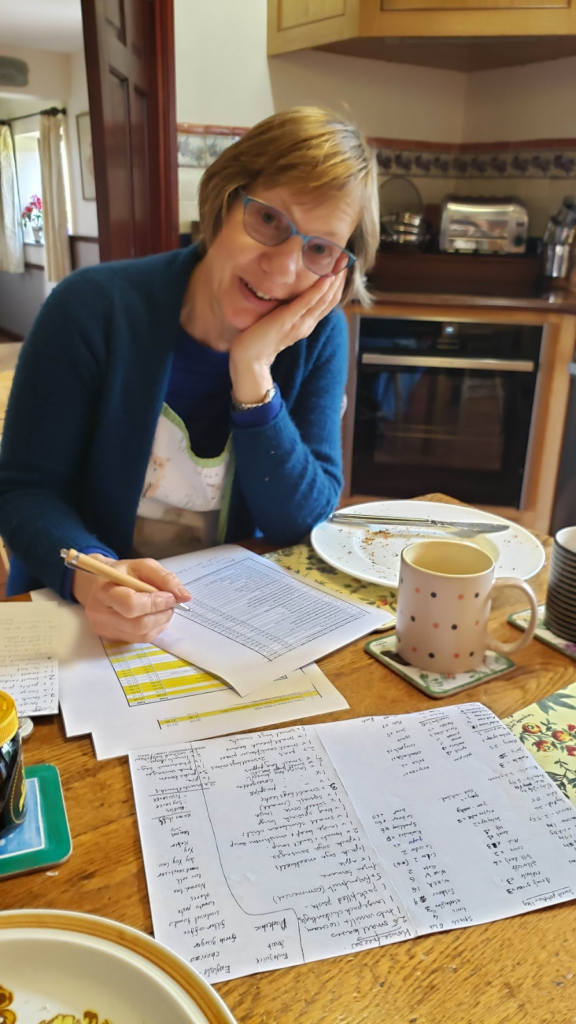
Why?
Not knowing everything in your cupboards results in poor decisions.
We can end up buying things that may go off, wasting money and food. You may also buy things you simply aren’t going to use, which again wastes food and money.
When you are in the store and you are “unsure” if you need an item, you are compelled to grab it just in case. Without co-ordinated action across a household you can end up buying too much of the same thing. We really don’t need 2 years supply of marmite.
What?
Go through all your store cupboards, freezer, fridge etc… and make a list of everything you own. Do it with the rest of the household or announce your findings to them so everyone is on the same page. You will find things you didn’t realise you had that someone put somewhere.
It will show items that are going to last well beyond the lockdown and other items that get used quickly. You can think twice before you pick up something just in case.
If you find you are low on rice but you have a month’s worth of carbs, you can just live off other things for a few weeks. Make a note to buy rice when you are in the store in two weeks time. You don’t need to rush out and buy rice right now or pay £50 for 2 kg’s of the stuff in panic.
No longer will you feel the need to buy anything because you are ”unsure” if you need it. Removed uncertainty.
The Super-Inventory
You can go into more details and work out how many meals each item is worth. This shows exactly how many days worth of food you have and helps everyone feel more secure. It also helps meal planning when you realise how many days worth of none fresh food you need to get through.
If you buy a weeks worth of fresh food you have to use it all within a week. This can give the illusion that by the end of that week you need to go and buy more food when you don’t. Instead you should buy half a weeks worth of fresh food and eat un-fresh things half the week. Or expect that week two is living off un-fresh things.
Informed Shopping
Doing things in panic is to do things without thinking. Instead we should be practicing ‘Informed Shopping’.
Be analytical and only get what you need.
With spare time at home, now is a great opportunity to really understand your shopping and needs and be an informed shopper.
To make an analytical shopping list of what you actually need to get when you are in the store, this is a great tool.
3. Try a Diet
Most humans could do with losing some weight. Now is probably the best time ever yet in your existence to do this. For humanity you can eat a little less and everyone can benefit.
Reasons to Diet
- Reduce Supermarket Burden – More for others and less strain on supermarkets.
- Less Exposure – Your two week shop now lasts three weeks. You stocked up an extra week by going nowhere. Awesome.
That means less shopping visits which potentially expose yourself or others to infection. - Good for your health – You will look and feel better which is great for your mental health during these hard times. (And it will reduce potential needs to go to hospital which is also very useful right now)
What Diet?
There are a million cool diets out there but we should focus on the ones that don’t require extra shopping to start it. So Keto etc… is impractical as you need to load up on carb empty foods and ignore half of the food in your cupboards.
Portion Sizes
My favourite is to try restricting your portion sizes. A good hack is to prepare food ahead of time and your portions. Put the left-overs away before you eat.
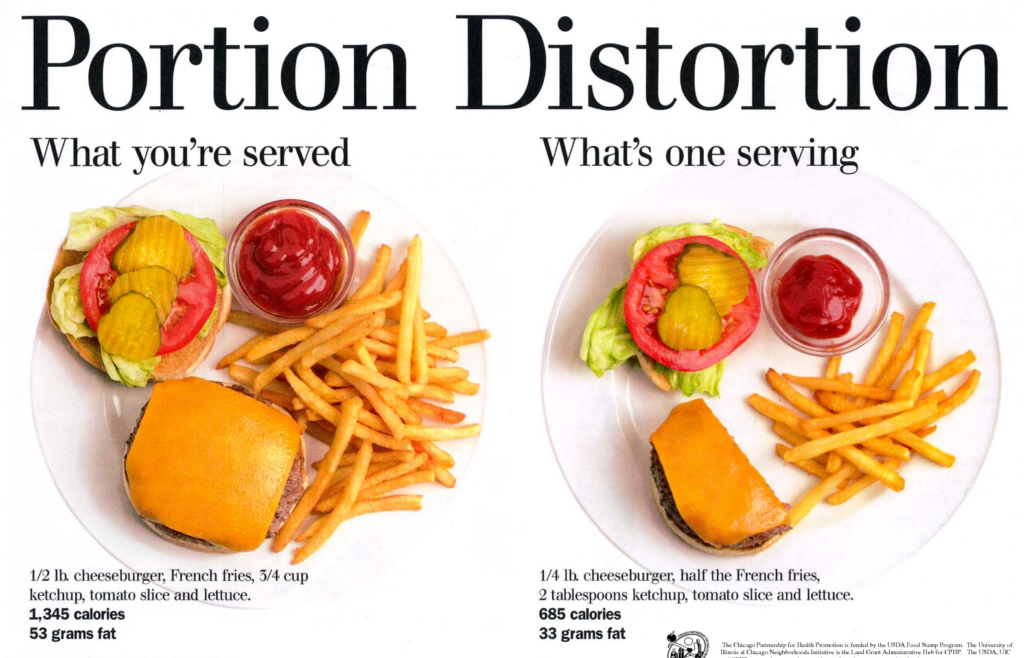
If you have a big pot of food on the table in front of you. After you finish your portion it is natural to serve yourself more whilst you are in the flow of eating.
If you have to go in the fridge. Get out a portion. Heat it up. It doesn’t feel natural.
You acknowledge that your second helping is essentially eating a second meal. You can recognise your greed for what it is.

I was on a camp once we were told to only eat until we were 3/4 full. This was a funny thing to get used to but quickly you realise that there is no need to eat until you are truly full. When you stop and listen to your body the feelings of hunger go away within half an hour.
Different things work for different people. To se a longer summary of things that might work during lockdown see here.
See extended blog on Diets during lockdown. (coming)
4. Become a Stoic
Learn the art of facing your fears and practice living with them. Make your mind resilient to the changes in the world and your circumstances. A skill we could all do with right now.

The stoics used exercises such as living off the scantiest of fare for a week at a time. If you were to become poor and not afford the luxurious food you are used to, you could live of porridge oats.
Stoics would try living off oats and water for a week. Doing the exact thing they were scared off if they lost their money. It would show that it isn’t that bad. It would allow them to worry less about terrible things happening. Then if n things happen they could also readily accept them without causing too much emotional drama.
Why not trying having a day a week where you only eat porridge oats (or whatever staple you were able to stock up on). I bet it won’t be that bad. You’ll learn that it’s not something to be too afraid of. I went two week once living only of HUEL and it was completely fine.
Going one day a week not using normal food is a great start. It will make your food go further and reduce demand on supermarkets. You could do more if you think it’s useful.
5. Try Living On a Meal Shake
Expanding on the last point.
If you want to try something a bit different to reduce your shopping burden, now is a great time to experiment with living on an all in one shake. One thing I can guarantee, being stuck in your home day after day for three months is going to be repetitive. You will forget most of what happens.
You will remember the important things like the people you were with, connecting with friends. Your work, your meals, TV, exercise will become a big blur.

Now is a great time to try a bit of a human experiment on yourself to see what happens when you live off a liquid diet for a few weeks. It will be a bit of fun and a new memory. When you can’t go out for adventure, you can make your own adventure inside.
When it’s over. Instead of saying you didn’t do much the whole time. You can say you tried a liquid food diet. It’s a bit weird, but it will stick out. If you do it maybe one of your mates will as well and that genuinely starts to make a bit of a difference on supermarkets. It also makes a difference in your home when one person isn’t eating. The food goes further for everyone else.
Also you really get to confront what it would be like to do this if it was required of you. And you’ll find you can totally do it and there is nothing to be scared about.
Summary
There are many psychological, economical and systemic reasons why we are seeing food reduction on shelves.
Don’t judge others for this and empathise with them. You have no idea what they are going through and it is better to assume that people are good than bad. It makes the world a much more enjoyable place.
Instead of looking at others for blame. Think of ways you can reduce your own burden on supermarkets.
There is no need to be bored, to complain or to feel useless. We can find ways to have our own adventure and be a small hero in our own ways during difficult times.
Similar Stories
- The Art of Listening to Yourself
- Attribution Errors: the curious case of genius mothers
- 50 Shades of WTF (lessons in love and life)
Author: Sam Harris
